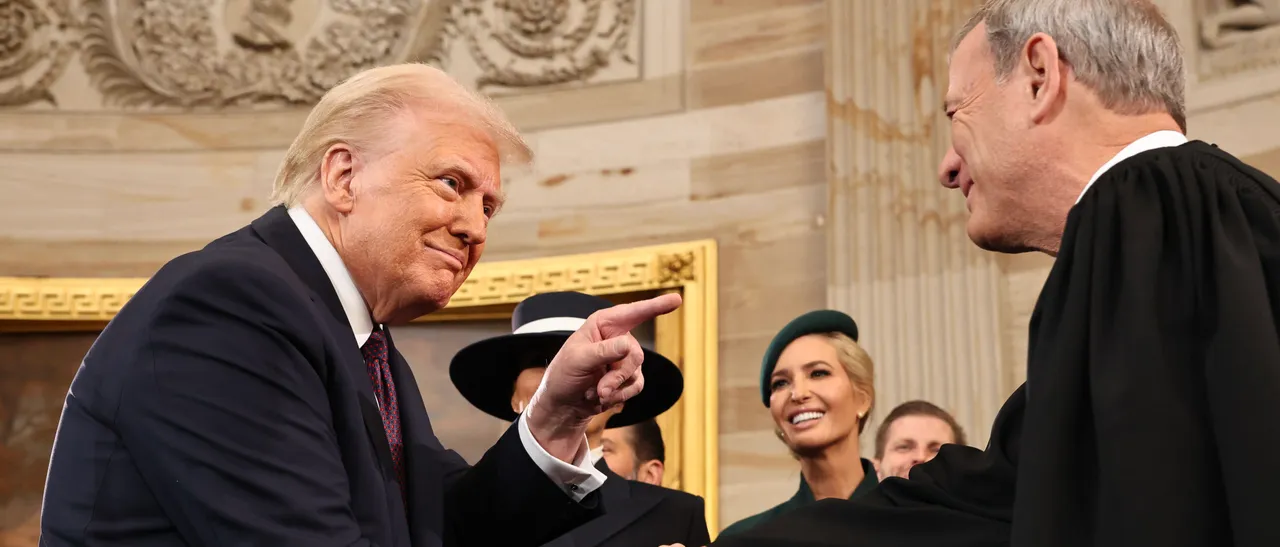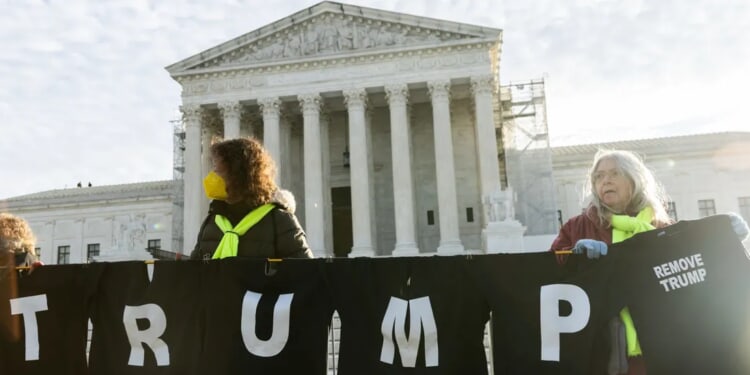The coming “Trump term” at the Supreme Court could prove to be one of the most consequential for executive power in recent history.
Cases related to President Donald Trump have topped the docket for the past several terms, but the lineup for 2025-2026 — which includes questions about the president’s power to remove executive officials and ability to issue tariffs using emergency authority — has teed up multiple potential landmark rulings defining executive power.
“No president in recent memory, perhaps ever, has purposefully tested the constitutional limits of separation of powers and executive authority more than Donald Trump,” John Malcolm, vice president of the Heritage Foundation’s Institute for Constitutional Government, told the Daily Caller News Foundation. (RELATED: Supreme Court Will Hear Major Case On President’s Ability To Fire Executive Officials)
While Trump signed a total of 220 executive orders during his entire first term, he’s already signed 210 orders since January. Many have faced legal challenges.
There are 222 active cases challenging actions by the administration, according to Lawfare.
The Trump administration stated as early as February its intention to directly challenge the 1936 ruling Humphrey’s Executor v. United States, a nearly 90-year-old Supreme Court precedent upholding Congress’ restrictions preventing the president from firing executive officials at “independent” agencies without cause.
“Relative to the first Trump Administration, the President has been far more active in removing commissioners of agencies that Congress intended to be independent, including members of the FTC, NLRB, MSPB, EEOC, and more,” Ilan Wurman, a constitutional law professor at the University of Minnesota, told the DCNF, noting it’s “relatively clear” the Supreme Court will reverse Humphrey’s Executor.
The Supreme Court let Trump remove several officials temporarily and will consider whether to reverse the precedent in December. In a separate case, it will also consider Trump’s decision to fire Federal Reserve Board member Lisa Cook over mortgage fraud allegations in January.
While Congress’ removal restrictions and requirements for bipartisan composition reflected its intention for many of these agencies to be independent, Wurman noted it has become “increasingly clear over the last several years that many of these agencies are no more attuned to politics than most ordinary executive branch agencies.”
“For example, since 2021, the FTC routinely approved major rules by a 3-2 vote along party lines. And so what’s the point of pretending these agencies are independent?” Wurman said. “And if that’s how the FTC will operate, why not remove some Democratic commissioners and try to appoint in their stead other Democratic commissioners who might work better with the Republicans on the Commission?”
Docket Domination
One of Trump’s boundary-pushing executive orders issued on his first day ends birthright citizenship for children of illegal aliens or migrants on temporary visas.
Litigation over the order last term led to the Supreme Court’s Trump v. CASA decision reining in lower court judges’ ability to block policies across the country using nationwide injunctions. The administration has already asked the justices to consider the birthright citizenship order on its merits this term. (RELATED: Trump’s War To End Birthright Citizenship Is Far From Over)
“Thus far, at least on a temporary basis, the President has fared far better before the Supreme Court than he has before the lower courts, which have done everything they can to try to frustrate the President from pursuing his agenda,” Malcolm said.
President Trump says he plans to go to the Supreme Court to watch oral arguments regarding the legality of his sweeping tariffs.
“I think I’m going to go to the Supreme Court to watch it. I’ve not done that.”
I think it’s one of the most important cases ever brought because we… pic.twitter.com/AHOh6XsFBE
— RedWave Press (@RedWave_Press) October 15, 2025
On its emergency docket, the Supreme Court has consistently rejected district court judges’ efforts to block the administration’s agenda.
The White House highlighted 21 “victories” at the Supreme Court in September, citing temporary rulings allowing the administration to cut grant funds and terminate probationary federal employees. The administration’s emergency docket wins has grown since then, with the justices allowing the end of protected status for hundreds of thousands of Venezuelan nationals in October.
White House spokeswoman Abigail Jackson told the DCNF that the “Trump Administration’s winning on behalf of the American people will continue.”
“The Trump Administration’s policies have been consistently upheld by the Supreme Court as lawful despite an unprecedented number of legal challenges and unlawful lower court rulings from far-left liberal activist judges,” Jackson said. “The President will continue implementing the policy agenda that the American people voted for in November and will continue to be vindicated by higher courts when liberal activist judges attempt to intervene.”
South Texas College of Law Houston professor Josh Blackman anticipates Trump “will be quite successful this year at the Court.”
“Last year, many of the Trump cases came to the Supreme Court on the emergency docket,” Blackman told the DCNF. “This year, many of these issues will come to the Court on the merits docket. This will be the Trump term.”
‘Trump Term’
A major Supreme Court case scheduled for November will consider Trump’s authority to issue tariffs under the International Emergency Economic Powers Act (IEEPA).
Trump suggested Wednesday he may attend oral arguments for the case, which would make him the first president to attend, according to USA Today.
“If we are not allowed to use what other people use against us, there is no defense. It would be a disaster for America,” Trump said. “That’s why I think I’m going to go to the Supreme Court to watch it. I’ve not done that. I’ve had some pretty big cases.”
As a candidate, Trump’s challenge to special counsel Jack Smith’s failed prosecution for alleged 2020 election interference led to a landmark presidential immunity decision, where the Supreme Court held that a former president cannot be prosecuted for official acts taken in office. Trump did not attend oral arguments in the presidential immunity case or in his challenge to Colorado’s effort to remove him from the 2024 ballot, which the Supreme Court unanimously rejected.

WASHINGTON, DC – JANUARY 20: U.S. President Donald Trump gestures to U.S. Supreme Court Chief Justice John Roberts after he was sworn in during inauguration ceremonies in the Rotunda of the U.S. Capitol on January 20, 2025 in Washington, DC. Donald Trump takes office for his second term as the 47th president of the United States. (Photo by Chip Somodevilla/Getty Images)
UC Berkeley School of Law Dean Erwin Chermerinsky wrote on SCOTUSblog that he has never “had a sense at the beginning of a term that it will be so momentous in deciding the future of American democracy” in 45 years following the court, noting prior Trump-related cases “seem just a prelude to this year.”
“Trump is seeking to greatly expand executive power and has taken many actions that are being challenged as illegal or unconstitutional,” Chermerinsky wrote. “There never before has been anything like this, and hundreds of lawsuits have been brought seeking to enjoin a myriad of Trump’s actions.”
Other issues playing out in the lower courts are on a path to the Supreme Court. (RELATED: ‘I Will Make A Prediction’: Alan Dershowitz Unravels Whether Supreme Court Will Let Trump Deport Gang Members)
There are ongoing legal challenges to Trump’s deployment of the National Guard in Democrat-run cities, use of the Alien Enemies Act to deport illegal migrants who are members of foreign gangs and layoffs of federal workers.
“While the Supreme Court has put a temporary halt to most of the lower court orders, allowing the Trump administration to implement its policies, these cases will now be argued, and the Supreme Court will issue final merits decisions,” John Malcolm of the Heritage Foundation told the DCNF. “I expect that the administration will prevail in most of these cases, thereby permanently redefining the President’s authority vis-a-vis Congress, the states, and the courts.”
All content created by the Daily Caller News Foundation, an independent and nonpartisan newswire service, is available without charge to any legitimate news publisher that can provide a large audience. All republished articles must include our logo, our reporter’s byline and their DCNF affiliation. For any questions about our guidelines or partnering with us, please contact licensing@dailycallernewsfoundation.org.










![Florida Officer Shot Twice in the Face During Service Call; Suspect Killed [WATCH]](https://www.right2024.com/wp-content/uploads/2025/12/Inmate-Escapes-Atlanta-Hospital-After-Suicide-Attempt-Steals-SUV-Handgun-350x250.jpg)






